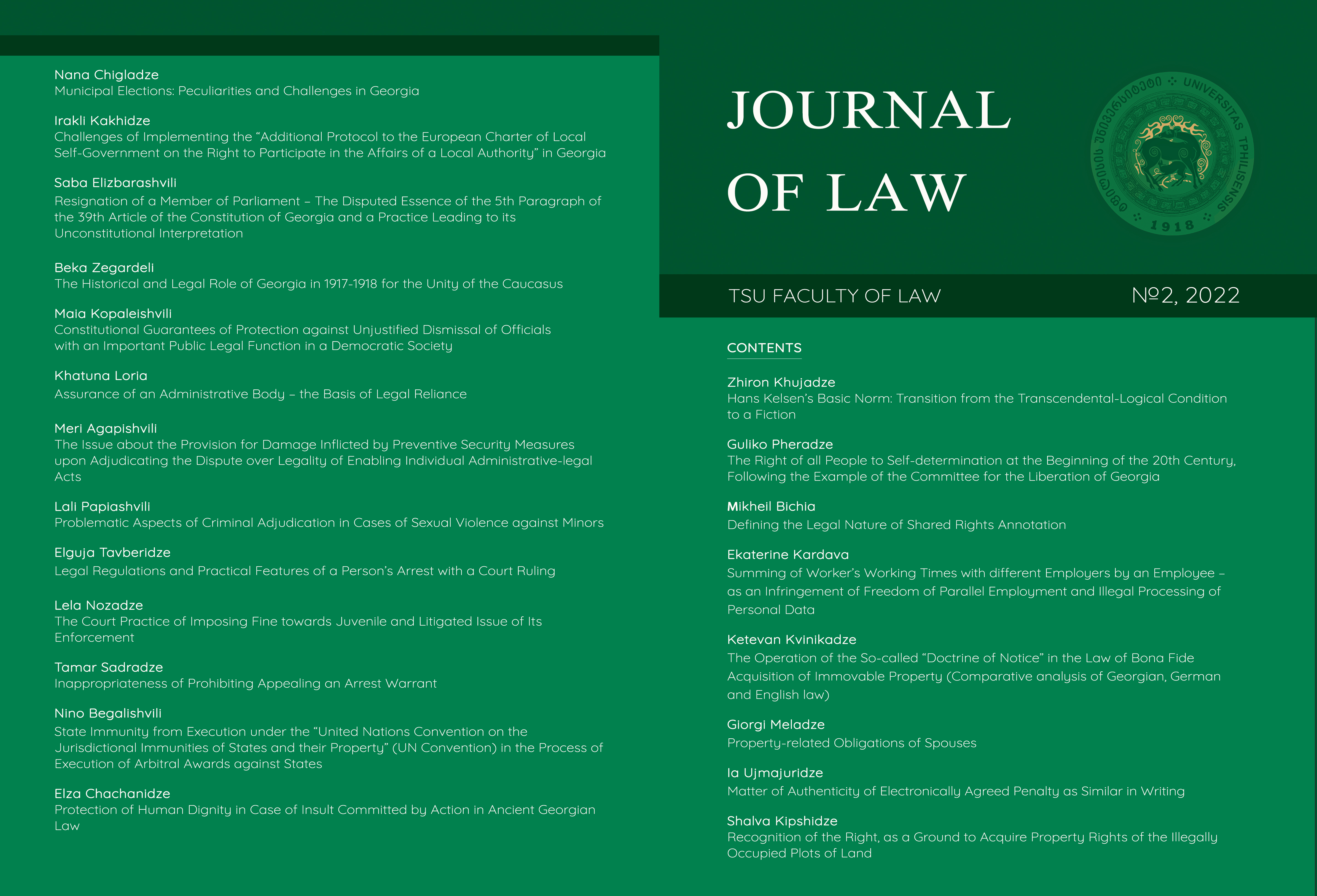Summing of Worker’s Working Times with different Employers by an Employee - as an Infringement of Freedom of Parallel Employment and Illegal Processing of Personal Data
DOI:
https://doi.org/10.60131/jlaw.2.2022.7019Keywords:
Parallel Employment, Labour, Competition, EU, Directive, Labour Code of Georgia.Abstract
In the modern labor market, parallel employment of a person in different businesses is an opportunity to mitigate the economic dependence on only one employer and manage own welfare life. In 2019, the EU Labor Directive 2019/1125 on Transparent and Predictable Working Conditions, legally strengthened the freedom of an employee to work with different employers in case of will. Restriction of this freedom is allowed only in reasonable and precisely defined cases.
The article explains the legal norm of the Labor Code of Georgia regulating parallel employment. Some wrong Georgian practices between competitors (employers) are criticized. In order to use the norm in a uniform and good sense, in order to understand the real purpose of parallel labor freedom, the models of European legal regulations, the provisions of 2019/1125 directive, and various laws/norms of Georgia are synchronized and analysed.
References
Association Agreement between the European Union and the European Atomic Energy Community and their Member States, of the one part, and Georgia, of the other part, 27/06/2014.
Constitution of Georgia, 24/08/1995.
Organic Law of Georgia “Labour Code of Georgia”, 27/12/2010.
Georgian Law “On Personal Data Protection”, 16/01/2012.
Directive (EU) 2019/1152 Of the European Parliament and of the Council of 20 June 2019 on Transparent and Predictable Working Conditions in the European Union.
Commission Staff Working Document, Impact Assessment Accompanying the document Proposal for a Directive of the European Parliament and of the Council on Transparent and Predictable Working Conditions in the European Union, European Commission, 21.12.2017, 70, 204-205.
Employment Protection Act of Sweden, 2022.
Employment Contracts Act of Republic of Estonia, 2022.
Explanatory Memorandum for the Proposal for a Directive of the European Parliament and of the Council on Improving Working Conditions in Platform Work, European Commission, 2021.
Labour Code of Republic of Bulgaria, 1986.
Republic of Lithuania, Law on the Approval, Entry into Force and Implementation of the Labour Code, 2016.
Changes to Labour Code, Legal News, KPMG, https://home.kpmg/bg/en/home/insights/2022/08/legal-news--changes-to-the-labour-code.html [14.11.2022].
Current Status of the Implementation of EU Directive 2019/1152 by Member States, 17/08/2022, https://cms.law/en/int/publication/current-status-of-the-implementation-of-eu-directive-2019-1152-by-member-states [14.11.2022].
Farrell C., Non-compete Clauses – Are They still Appropriate?, 27/07/2021,
https://parissmith.co.uk/blog/non-compete-clauses/ [14.11.2022].
Georgiou D., The New EU Directive on Transparent and Predictable Working Conditions in the Context of New Forms of Employment, European Journal of Industrial Relations, https://journals.sagepub.com/doi/full/10.1177/09596801211043717 [14.11.2022].
Kardava E., Interpretation of the Trial Labou in Georgian Case Law and EU Directive 2019/1125, Case Law Analysis, №1, 2021, 30 (in Georgian).
Kardava E., Georgian Labour Law Reform in terms of Requirements of European Integration and Association Agreement, Dissertation, Tbilisi State University, 2018 (in Georgian).
Kardava E., Legal Approximation - Guidline Principles, the Parliament of Georgia, association “European Time”, Fridriech Ebert Stiftung, 2017 (in Georgian).
http://www.ehea.info/page-how-does-the-bologna-process-work [14.11.2022].
https://education.ec.europa.eu/education-levels/higher-education/inclusive-and-connected-higher-education/bologna-process [14.11.2022].
Downloads
Published
How to Cite
Issue
Section
License

This work is licensed under a Creative Commons Attribution-ShareAlike 4.0 International License.









